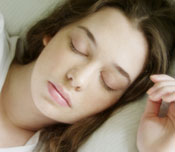 Dr. Anna Morin and colleagues from the Massachusetts College of Pharmacy and Health Sciences report, “Most nonpharmacologic interventions can be combined with one another or with pharmacologic interventions to optimize outcomes, particularly in those with chronic and debilitating insomnia.”
Dr. Anna Morin and colleagues from the Massachusetts College of Pharmacy and Health Sciences report, “Most nonpharmacologic interventions can be combined with one another or with pharmacologic interventions to optimize outcomes, particularly in those with chronic and debilitating insomnia.”
Their article is well referenced and discusses many options. But most interesting is the mention of a 1999 review of the benefits from nonpharmacological treatments of chronic insomnia.
Here are the key points.
- They produce reliable and durable changes in several sleep parameters of chronic insomnia sufferers.
- Between 70% and 80% of treated patients benefit.
- For typical patients, treatment reduces the time until they fall asleep and/or the time to awakening after sleep to below or near the 30-minute criterion used to define the severity of insomnia.
- Sleep duration is increased by a modest 30 minutes
- Sleep quality and satisfaction with sleep patterns are significantly enhanced.
- Sleep improvements achieved are sustained for at least 6 months.
- However, there is no clear evidence that improved sleep leads to meaningful changes in daytime well-being or performance.
At the time of this review, 3 treatments met the American Psychological Association (APA) criteria for psychological treatments for insomnia: stimulus control, progressive muscle relaxation, and paradoxical intention. Other treatments that met APA criteria for probably efficacious included sleep restriction, biofeedback, and multifaceted cognitive-behavior therapy.
Dr. Morin’s article will bring you up to date.
7/10/07 21:12 JR